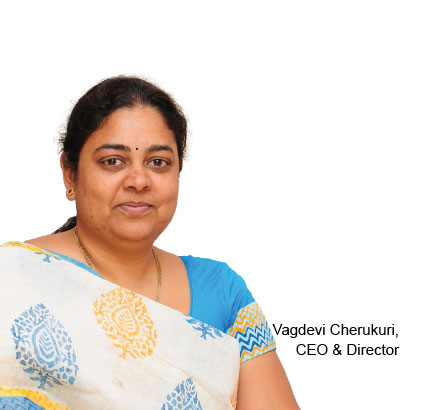 At the onset of the 2000’s, IT was in its nascent stages in India in terms of adoption. It was then that two techies working in the US set out to startup a product/services company in India with the goal to target the nascent domestic IT market. “We saw an opportunity for IT services in both Web and Enterprise fields in the country and wanted to move in early, leveraging on our experience,” explains Vagdevi Cherukuri, CEO, Director, Varna Technologies. Along with Krishna Daggubati, CTO, Director, Varna Technologies the duo worked hard to incorporate the company in 2006. The company that provides application development services to the enterprise sector soon won over reputed clients such as Andhra Sugars, Ultratech Cements, Lanco Global Systems, KPMG to name a few. Since its inception, the company has grown from strength to strength.
At the onset of the 2000’s, IT was in its nascent stages in India in terms of adoption. It was then that two techies working in the US set out to startup a product/services company in India with the goal to target the nascent domestic IT market. “We saw an opportunity for IT services in both Web and Enterprise fields in the country and wanted to move in early, leveraging on our experience,” explains Vagdevi Cherukuri, CEO, Director, Varna Technologies. Along with Krishna Daggubati, CTO, Director, Varna Technologies the duo worked hard to incorporate the company in 2006. The company that provides application development services to the enterprise sector soon won over reputed clients such as Andhra Sugars, Ultratech Cements, Lanco Global Systems, KPMG to name a few. Since its inception, the company has grown from strength to strength.However, having worked abroad for several years, the team had to deal with the lack of proper collaboration between different stakeholders at the clients organizations in the domestic market. “Another major hurdle that we faced was the dynamics of such businesses which dictated change requirements very frequently at rapid turnaround pace,” adds Vagdevi.

One Stop Shop for All IT Needs
Back in those days, IT spend was relatively low, along with other constraints such as having no dedicated in-house IT resources, computer-naïve users, weak infrastructure etc. The team turned these challenges into opportunities and optimized its offerings to be more practical and in-line with the environment.
Building a Strong Roster of Services
Since their very first days, the team was working on creating an application development framework using open source technologies that will drastically reduce the development time for applications. “By 2010 we were building various solutions on this platform,” adds Vagdevi. Varna’s flagship product “iSMART”, an Enterprise Campus Management system with more than 16 modules was developed on the same platform to target the growing need of automation for organizations in the education domain. The application has been very well received by the education industry and has reached a user base of 500,000+ students and 50,000+ faculty and staff across 500+ schools/colleges. Some of the reputed clients include Birla Institute of Technology & Science, Catapult Learning (USA) and Sri Chaitanya Group, which is one of the largest educational organizations in the country.
Apart from their flagship product, Varna provides enterprise technology solutions that are tailor-made to fit into ones business needs and evolve with it. “Be it HR, Payroll, Inventory, CRM, Document Management or any custom enterprise application, Varna has enabled dozens of companies derive significant business impact and ROI,” explains Vagdevi. The company has also built “FlexiFrame", a business application framework that helps clients achieve shorter development lifecycles (3x faster) and to lower costs of ownership by providing low maintenance, scalable enterprise solutions. In addition to this, Varna also has deep expertise in providing web solutions and mobile solutions.
The young organization is spearheading the market and has achieved 35% growth year on year on its core product/services for the last 3 years. “By the end of fiscal 2017, we will hit the Rs 25 crore revenue mark,” says a determined Vagdevi. According to Vagdevi, Varna has achieved the success owing to the team’s experience in implementing solutions across various domains such as education, retail, infrastructure and web with latest technologies and tools.
The forward looking company plans to promote iSMART Cloud and target small-medium strength schools/colleges/institutions across the country. Additionally, they will continue innovation in terms of its products by incorporating latest technologies and features. “We are looking to diversify our product portfolio across other niche areas such as platforms and tools for Online Learning & Assessment, Social Collaboration and Analytics,” Vagdevi concludes.
Building a Strong Roster of Services
Since their very first days, the team was working on creating an application development framework using open source technologies that will drastically reduce the development time for applications. “By 2010 we were building various solutions on this platform,” adds Vagdevi. Varna’s flagship product “iSMART”, an Enterprise Campus Management system with more than 16 modules was developed on the same platform to target the growing need of automation for organizations in the education domain. The application has been very well received by the education industry and has reached a user base of 500,000+ students and 50,000+ faculty and staff across 500+ schools/colleges. Some of the reputed clients include Birla Institute of Technology & Science, Catapult Learning (USA) and Sri Chaitanya Group, which is one of the largest educational organizations in the country.
Apart from their flagship product, Varna provides enterprise technology solutions that are tailor-made to fit into ones business needs and evolve with it. “Be it HR, Payroll, Inventory, CRM, Document Management or any custom enterprise application, Varna has enabled dozens of companies derive significant business impact and ROI,” explains Vagdevi. The company has also built “FlexiFrame", a business application framework that helps clients achieve shorter development lifecycles (3x faster) and to lower costs of ownership by providing low maintenance, scalable enterprise solutions. In addition to this, Varna also has deep expertise in providing web solutions and mobile solutions.
The young organization is spearheading the market and has achieved 35% growth year on year on its core product/services for the last 3 years. “By the end of fiscal 2017, we will hit the Rs 25 crore revenue mark,” says a determined Vagdevi. According to Vagdevi, Varna has achieved the success owing to the team’s experience in implementing solutions across various domains such as education, retail, infrastructure and web with latest technologies and tools.
The forward looking company plans to promote iSMART Cloud and target small-medium strength schools/colleges/institutions across the country. Additionally, they will continue innovation in terms of its products by incorporating latest technologies and features. “We are looking to diversify our product portfolio across other niche areas such as platforms and tools for Online Learning & Assessment, Social Collaboration and Analytics,” Vagdevi concludes.



.png)